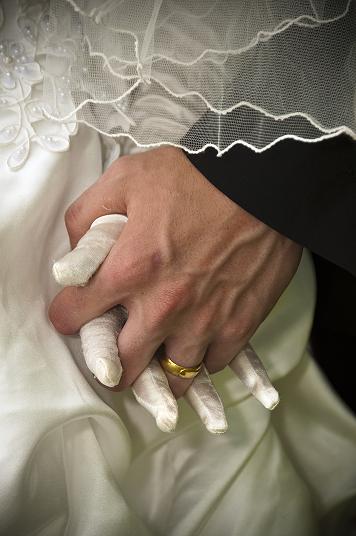 It being Valentine’s Day tomorrow, Eric and I decided to do something special and we’re very excited to share this with you. We’re going to start a series here at PreEngaged on examining the traditional wedding vows. Over the next several posts, we’ll cover these vows step-by-step. So, share these posts and invite your friends to discuss these words here at PreEngaged – they are some of the most important words humans ever speak.
It being Valentine’s Day tomorrow, Eric and I decided to do something special and we’re very excited to share this with you. We’re going to start a series here at PreEngaged on examining the traditional wedding vows. Over the next several posts, we’ll cover these vows step-by-step. So, share these posts and invite your friends to discuss these words here at PreEngaged – they are some of the most important words humans ever speak.
While there are several variations of wedding vows used in wedding ceremonies nowadays, the traditional wedding vows go something like this:
I, (name), take you (name), to be my lawfully wedded (wife/husband), to have and to hold from this day forward, for better or for worse, for richer, for poorer, in sickness and in health, to love and to cherish; from this day forward until death do us part.
On my wedding day, I was so focused on trying to get through the wedding (and several things went wrong!) that I did not concentrate enough on the vows I was repeating. In fact, I probably could not have repeated much of them to you if you had asked me to recite them an hour later. Considering the commitment I had just made, I should have been able to remember what I had just repeated. More so, I should have spent time before the wedding memorizing our vows and getting a realistic feel for the weight of what I going commit to before God, Eric, and all of our witnesses.
As the wedding vow begins, the bride and groom say that they take each other as husband or wife. What does it mean to take someone in marriage? In modern America, this declaration may seem too possessive. What do you mean you are going to take me? However, the concept of taking someone in marriage is to accept him or her completely. You are taking his or her talents, flaws, dreams, failures, and potential. You are completely embracing him or her as a part of yourself forever.
By taking him or her as part of yourself, you are rejecting all others. When you say YES to your bride or groom, you are saying NO to the rest of the world. When you say “I take you,” you are saying, “Out of everyone else in the world, I am committing to you and you alone.” This is where a lot of men and women can get into trouble if they are not vigilant.
Our society welcomes divorce and sometimes even expects it. Couples being married fifty years used to be the norm; but, now a successful marriage of even fifteen years is often considered amazing and highly commendable! When you stand before God and say that you are taking this person to be your wife or husband, you are committing to be that person’s husband or wife until one of you passes away. This is a heavy commitment and it should not be entered into lightly.
When you stand before a crowd of witnesses and say that you will take your bride or groom to be your wedded husband/wife, the greatest witness present is God. God instituted marriage. It was He who said, “it is not good for man to be alone” (Genesis 2:18). As important as your commitment is to your spouse, it is far more important to God. You may flippantly repeat a vow at your wedding but there is nothing flippant about it to God. When we vow to Him, it changes things on a supernatural level and we can’t change that simply because we are tired of being married.
As you plan for your future marriage, consider the words I take you to be my husband/wife. Mull over what that small statement means. Consider your lives together in ten, twenty, thirty, and forty years. And spend time before the wedding memorizing your vows and understanding the weight of the covenant you are about to commit before God, family, friends, and society.
Are you ready to make such a weighty commitment to God and to each other?
Leave a Reply